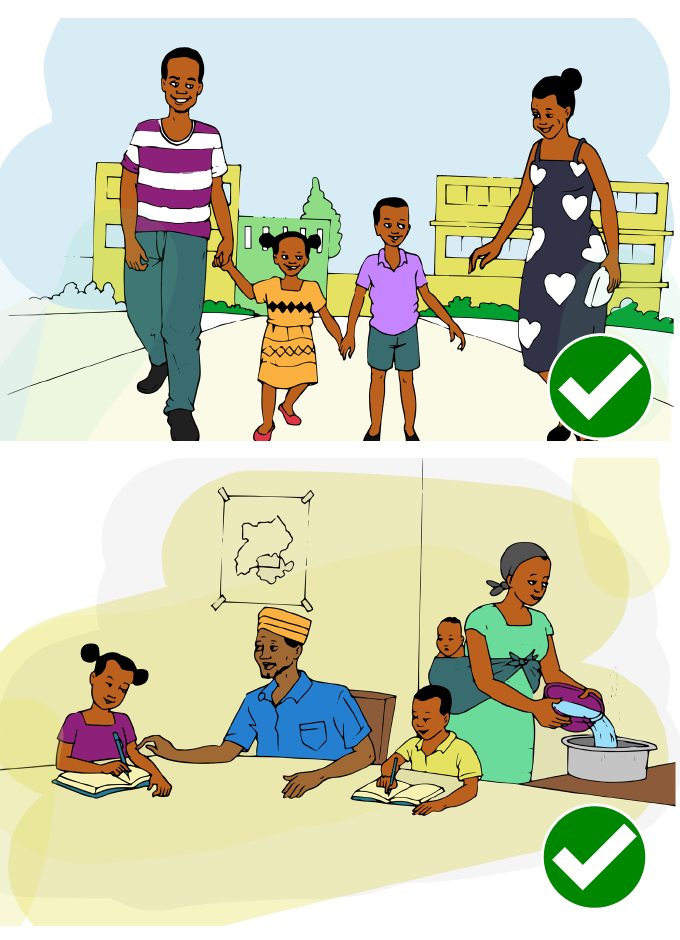Upbringing and education arrangements: Parenting styles
Strongly recommended
Authoritative Parenting
Parents should be responsive to their children’s emotional needs, while at the same time being demanding and in control
Beware !
Authoritarian Parenting
Parents should be demanding and in control, but they should not ignore their children’s needs
Beware !
Permissive Parenting
Parents should nurture their children but not allow children to get away with bad behaviour

Parents should love and nurture their child, at the same time they are demanding and in control
Parents should have high levels of control and maturity demands over their children, combined with high levels of nurturance. This means that they show warmth, support, effective monitoring, control, discipline, positive discussion and responsiveness to their children’s needs. Parents rely on positive sanctions to gain their child’s compliance and encourage their child to express himself when he disagrees. This is referred to as ‘authoritative parenting’. According to international research, authoritative parenting plays an important role in children’s academic performance.
There are 3 types of parenting that have been shown to have different effects on the wellbeing of children:
Authoritative parenting – Where parents have high demands from their children but are also loving and nurturing their emotional needs. This is seen as the most effective type of parenting.
Permissive parenting – Where parents show love and care towards their children, but not give enough direction and guidance.
Authoritarian parenting – Parents are strict and demanding but are not supportive enough of the children’s emotional needs.
What practitioners say
Consistent with literature research:
Ensure child-friendly disciplining. Offer the child appropriate measures in disciplining actions. Avoid abusive actions that can harm a child.
Both parents should participate in education. Both parents should be involved with the school education of the child. They should both be aware of their situation at school and have contact with teachers, provide support with homework etc.
Parents shouldn’t favour children. Both girls and boys should be equally loved and supported by both parents.
Make sure that girls and boys are treated equally. There should be no discrimination in assigning resources and responsibilities to them, or in reprimanding them.
Take time to understand the needs of children. Parents should make sure they understand their children’s needs and provide for them.
Other suggested practices:
Make sure children are consulted about their education. Make sure they are safe and comfortable in their schools.
Try to learn more about parenting skills. Ask others to find out if there are resources that can help you to learn about good parenting. These could include radio broadcasts, books or gatherings.
Resources and Methodology
During the orientation process of the available literature, we were able to identify three interventions, these being:
- Authoritative parenting
- Authoritarian parenting
- Permissive parenting
Authoritative parenting is characterised by having high levels of control and maturity demands, combined with high levels of nurturance. These parents rely more on positive than negative sanctions to gain their child’s compliance and encourage their child to express himself/herself when the child disagrees (Handbook, p. 452).
Authoritarian parents display high levels of control along with low levels of clarity and nurturance. These parents rely on power-assertive forms of discipline. They are less likely than authoritative parents to provide reasons when attempting to alter their child’s behaviour and discourage expressions of the child’s disagreement (Handbook, p. 452).
Permissive parenting is characterised by parents who display low levels of control and maturity demands, combined with higher levels of nurturance. They are less likely than authoritative parents to enforce rules or structure for their child’s activities (Handbook, p. 452).
For the purpose of this PICO question, we compare authoritative parenting with the two other forms of parenting, because authoritative parenting shows a high level of demandingness and nurturance, while the other two parenting styles either have a low level of demandingness or nurturance (Handbook, p. 452).
For children, is authoritative parenting more effective than other forms of parenting, for their well-being?
The databases used are: HeinOnline, Westlaw, Wiley Online Library, JSTOR and Taylor & Francis, Peace Palace Library.
For this PICO question, keywords used in the search strategy are: parenting, upbringing, raising, arrangements, children, development, upgrowing, well-being, divorce.
The four main sources used for this particular subject are:
- Sanford M. Dornbusch, Philip L. Ritter, P. Herbert Leiderman, Donald F. Roberts and Michael J. Fraleigh, The Relation of Parenting Style to Adolescent School Performance (1987)
- Fletcher, Steinberg and Sellers, Adolescents’ well-being as a function of perceived interparental consistency (1999)
- The Handbook of Family Communication, edited by Anita L. Vangelisi, Chapters 9, 20 and 27 (2004)
- Erlanger A. Turner, Megan Chandler and Robbert W. Heffer, The Influence of Parenting Styles, Achievement Motivation and Self-Efficacy on Academic Performance in College Students (2009)
- Linda Nielsen, Shared Parenting After Divorce: A Review of Shared Residential Parenting Research” (2011)
These sources are largely based on an RCT and several observational studies. According to the HiiL Methodology: Assessment of Evidence and Recommendations, the strength of this evidence is classified as ‘low’ to ‘moderate’.
Desirable outcomes
For the child’s interest, authoritative parenting by both parents with warmth, support, effective monitoring, control, discipline, positive discussion and responsiveness to children’s needs is essential (Handbook, p. 204). Studies indicate the following:
Children of separated parents benefit the most when their father is actively engaged in their lives across a wide range of daily activities and when he has an authoritative rather than permissive or authoritarian parenting style (Nielsen, p. 591)
Children are less depressed, were less aggressive and had higher self-esteem when both parents are authoritative (Nielsen, p. 599)
Children with at least one authoritative parent have been linked to better academic competence and higher grades (Fletcher, Steinberg and Sellers p. and Dornbusch et al., p. 1256)
Children from parents applying an authoritative parenting style do better at school compared to the other parenting styles (Dornbusch et al., p. 1256).
A consistent and authoritative parenting style is effective (Afifi, p. 751). Parenting characteristics such as supportiveness and warmth continue to play an important role in influencing a student’s academic performance (Turner et al., p. 343).
Authoritative parenting is associated with lower levels of substance abuse for children (Handbook, p. 616)
Parenting characteristics such as supportiveness and warmth continue to play an important role in influencing a student’s academic performance (Turner et al., p. 343).
Undesirable outcomes
Children from families applying authoritarian or permissive parenting tend to do less well at school compared to the authoritative parenting style (Dornbusch et al., p. 1256 and Turner, p. 338).
Parenting styles with controlling contexts (such as the authoritarian parenting style) diminish autonomous motivation and enhance controlled motivation (Turner, p. 339). In other words, the authoritarian parenting style limits the ability of children to make their own choices and control their own life.
Balance of outcomes
In determining whether the authoritative parenting style is more effective than the authoritarian and permissive parenting styles, the desirable and undesirable outcomes of both interventions must be considered.
The literature suggests that, regarding academic achievement, the authoritative parenting style is in the interest of the child while the authoritarian and permissive parenting styles are not.
The balance of outcomes is in favour of an authoritarian parenting style.
Recommendation
Taking into account the balance of outcomes, the high effect on children’s well-being and the strength of the evidence, we make the following strong recommendation: For children, authoritative parenting is more effective than other forms of parenting for their well-being.


